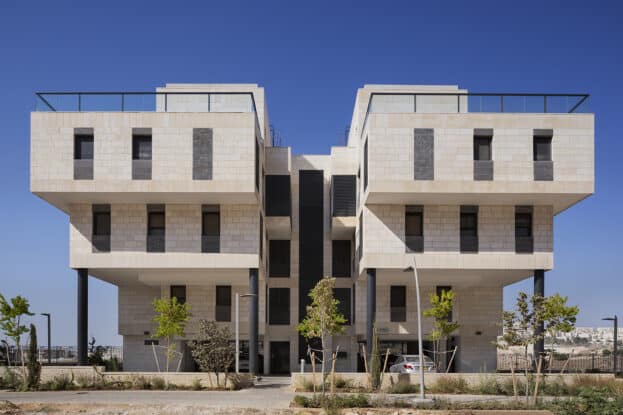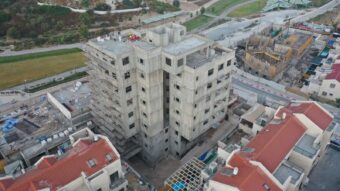Money is cheap, investment buyers are back, and construction rates are steadily declining. All signs indicate that 2021 will be a year of continued rising home prices in Israel, unless the Covid-19 pandemic changes everything, once again.
Anyone who has followed the Israel real estate scene in recent years knows that the residential market is rarely on a downward trend. This is not surprising, considering there is a shortage of available land, a slow and complicated planning and construction process, and a high population growth rate. In the past, many attempts were made to pour some cold water on the burning home prices in Israel. At the beginning of the previous decade, the Bank of Israel imposed strict restrictions on the scope of possible financing for apartment purchases, and a few years later the government joined the containment efforts by increasing Mas Rechisha (purchase tax) for investment buyers, and by launching an extensive program to build subsidized apartments.
However, by the beginning of 2021 – all the “restraining factors” seem to have disappeared. The government and the Bank of Israel have not simply stopped interfering to ease the increase in demand, but they appear to be actively encouraging it. This is all taking place in a time when almost all the systems that are supposed to stimulate the supply to the market were heavily affected by the Covid-19 crisis.
The Israeli market stands at the beginning of the New Year with a rare set of conditions that may well lead to a sharp increase in home prices in Israel in the coming year with several factors driving property values upwards:
1. Declining supply – fewer plans, fewer land purchases, fewer construction starts
The Corona pandemic has affected the various branches of the Israeli economy differently. The tourism, culture, leisure, and entertainment sectors have been almost completely wiped out, whereas the residential property market has been barely scathed. This is based on the number of transactions in the past year, which has dropped by only a few percent. However, the production chain for the supply of housing has been totally disrupted by the pandemic.
Beginning with the first stage, that of planning, in 2020, plans for the construction of only 95,000 apartments were approved, about 30% less than the amount approved in 2019 – 135,000. Only 7,800 approved apartments were in the high demand Tel-Aviv area. In other words, most plans were approved for areas where they may not even be constructed in the end.
The next stage is for the marketing and sales of the approved land plots to developers, through the Israel Land Authority (ILA) which manages all state-owned land, constituting about 93% of the total territory of Israel. Here, the data for 2020 shows a drop of 50% compared with an average year. Sales of land for construction reached only 22,000 apartments during the year, including 8,000 in the last week of December. This is in comparison to average sales of about 40,000 apartments per year in recent years.
The final stage in the chain – the number of new residential construction starts, was also impacted this year, although to a lesser extent. The current estimate is that there was a 15% drop in 2020. However, the full impact of the low marketing sales and the reduced number of approved plans, was not yet felt during the course of last year.
2. The era of apartment subsidies is over
About a month ago, after many delays, Mechir L’Mufchat (the “Housing at Reduced Prices”) program for affordable housing, was launched by Yaacov Litzman, the Minister of Construction and Housing. However, with all due respect to the new program, its scope and impact are anticipated to be significantly less than the previous affordable housing plan – Mechir L’Mishtaken (the “Buyer’s Price Program”).
The dominance of the “Buyer’s Price Program” is demonstrated by the following statistic – in the last three years, subsidized apartments accounted for approximately 35% of all new apartments sold in Israel. This represents tens of thousands of apartments that were sold as a part of this program in all areas of the country, at a minimal discount of 200,000 Shekels, and reaching a discount of almost one million Shekels in areas of high demand.
The new “Housing at Reduced Prices” program, on the other hand, is almost unavailable in the center of the country, and in any case, until now tenders have been published for only a few thousand initial apartments, out of planned tenders for a total of 20,000 apartments.
This means that the government has dramatically reduced housing subsidies and that there are fewer options available for qualified buyers. This will increase the demand for housing on the free market which will further drive property values upwards. Of course, this may change during the coming year, after a new government is formed. But considering the range of economic and health challenges posed by the Corona era, it is doubtful that the issue of housing will be given priority.
3. “Cheap money” increases the buying power of the public and encourages investment
A decision was made by the Bank of Israel to cancel restrictions on the portion of mortgages allowed at the cheaper prime interest rate. This will raise the permitted amount to be taken at this rate from one-third to two-thirds of the total loan. It should be noted that this decision was made by the Bank of Israel when the bank’s interest rate was already extremely low, at 0.1%. The reduction in the cost of money, when it was very “cheap”, is expected to further increase the buying power of the public, encourage the purchase of apartments for investment, and continue to cause home prices in Israel to increase.
4. The return of investors to the housing market in Israel drives home prices upwards
Even before any impact of the new Bank of Israel mortgage policy, in July 2020 investors received a boost from Minister of Finance Israel Katz, when he decided to significantly reduce the rate of purchase tax on investment property – from a minimum rate of 8% to 5%. The effects of this decision were immediate. Based on data recently published by the Ministry of Finance, in the third quarter of 2020 (July-September), 4,300 investment apartments were purchased in Israel – 19% more than in the same quarter of 2019. This is also the highest quarterly figure since the third quarter of 2019.
Investment in residential property, in general, is an attractive prospect for investors, looked upon as a safe haven that continues to prove its resilience, in particular, during economic turmoil when other traditional investment vehicles are highly volatile and unpredictable.
5. Political chaos in Israel leads to reduced output and instability in the market
The upcoming national elections, which are due to take place in March, will be the fourth round of elections in Israel in two years. During the past two years, the country effectively lacked a real government. For most of this period there has been an interim government with limited powers which mainly focused on emergency measures for dealing with the Corona crisis. Even during the past seven months, when a parliament-backed government was in place, it suffered from internal disputes and functioned rather poorly.
This unhealthy political situation has had several effects on the housing market. When there is a lack of clear policy, government bodies such as the Planning Administration and ILA tend to work on “autopilot”, leading to reduced output, which in turn leads to a supply shortage. Furthermore, if indeed housing prices will jump as forecasted, then in the absence of a functioning government the state will be unable to deal effectively with the situation and enact measures to curb the rise in home prices in Israel.
6. Global unrest, antisemitism, and economic uncertainty encourages overseas buyers to purchase property in Israel
Despite the launching of the vaccination program in the Western world, the Corona pandemic is still in full force and it is too early to know when it will end and what its results will be. However, basic data shows, that so far, Israel has dealt relatively successfully with the virus from a health perspective – both its low mortality rates and the successful roll-out of the mass vaccination program, which is progressing faster than in any other country. Meanwhile many other Western countries, including the US, Britain, and France, have record-breaking mortality rates and their vaccination programs are only slowly being implemented.
Alongside this, the period of the plague is liable to stir up feelings of anti-Semitism and xenophobia in various countries, as has happened throughout history throughout the period of economic crisis and slump. This should be added to the political unrest in the United States that has over the past year often lashed out into violence and culminated last week, with the violent takeover of supporters of outgoing President Donald Trump on the Capitol building in Washington.
Thus, at the end of the Corona pandemic, when international borders are reopened, there is expected to be a sharp rise in the number of Jews wishing to make Aliya, or invest their money in Israel – a trend that will obviously have an impact on home prices in Israel.
In conclusion, it appears that all the conditions exist for the housing boom in Israel to continue in 2021. However, we will end with one figure that reminds us of a particularly important issue — the level of unemployment today in Israel which is fast approaching 15%, one of the highest figures in the country’s history. It is currently impossible to predict when the Israeli economy will emerge from the severe economic crisis that has befallen it due to the virus. But as long as unemployment is this high, and rising, it may serve to temper the ongoing upward movement in home prices in Israel.







